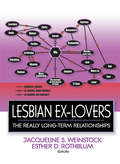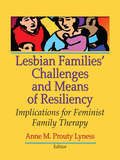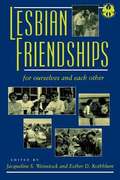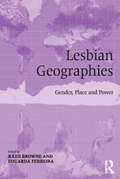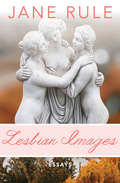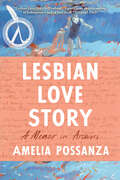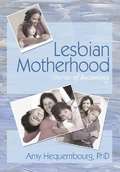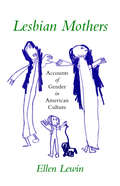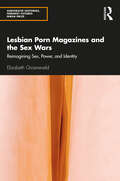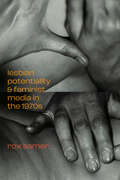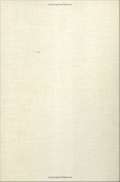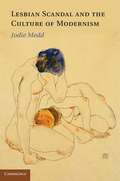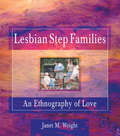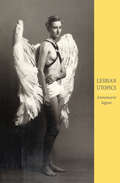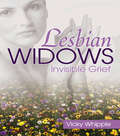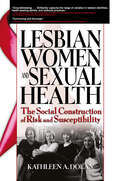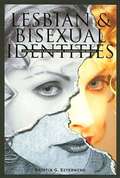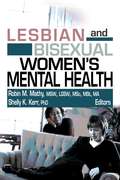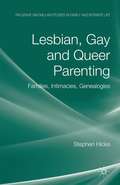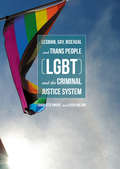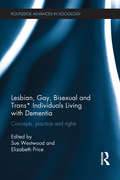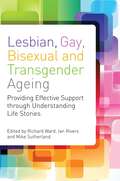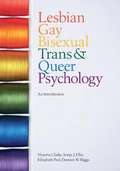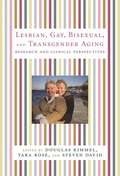- Table View
- List View
Lesbian Ex-Lovers: The Really Long-Term Relationships
by Esther D Rothblum Jacqueline Weinstock"We have earned a certain place in each other&’s lives, and in the best of times we can rest on what we have made together." Lesbian Ex-Lovers: The Really Long-Term Relationships examines the need for the development of better understanding and more critical analysis of lesbian ex-lover relationships. This eye-opening look into the minds and hearts of women offers personal insight into the possibilities for and potential pitfalls of lesbian ex-lover relations. This book contains personal stories, fictional accounts, poetry, and theoretical analyses of the frequency and significance of ex-lovers at different stages in a relationship. Topics of interest in Lesbian Ex-Lovers include: the roles ex-lovers play in our lives ex-lovers as contexts for change and development how we continue to be influenced by ex-lovers letting go and moving on ex-lovers as current friends and family themes of betrayal and loss of faith reconstructing friendships and community the mystique of the ex-lover friend/family connections among lesbian ex-lovers "Rather than totally scrap a relationship, we recycle it-from lover to ex-lover to friend in a relatively short half-life." Lesbian Ex-Lovers is the only book in print that explores how a lesbian&’s ex-lovers impact her subsequent romances and lifestyle. This special collection adds a new dynamic to the current literature for and about the lesbian community. Lesbian Ex-Lovers offers advice, anecdotes, and interpretations from such authors, poetesses, and artists as: Michelle Gibson, PhD-educator and editor of Femme/Butch: New Considerations of the Way We Want to Go- who says goodbye to her lover in a sad, passionate elegy Marny Hall-Psychotherapist, editor of the anthology Sexualities, and author of several books, including The Lavender Couch: A Consumer&’s Guide to Psychotherapy for Lesbians and Gay Men-who muses on the unique bonding between lesbians and their ex-lovers, lending a mystique that surrounds the lesbian lifestyle Alison Bechdel-creator of the comic strip Dykes to Watch Out For-who presents a humorous comic strip thanking her former lovers for teaching her about herself Jane Futcher-newspaper reporter and author of three novels-who uses a chapter in her novel to illustrate the tensions that can occur when ex-lovers choose to remain friends, especially when those bonds provoke jealousy in both current and ex-lovers Renny Christopher-educator and award-winning poetess-who expresses her love, loss, and regret in three poems about her ex-lover and much more!
Lesbian Families' Challenges and Means of Resiliency: Implications for Feminist Family Therapy
by Anne M. Prouty LynessAn inside look at the unique challenges of the lesbian experienceLesbian Families&’ Challenges and Means of Resiliency: Implications for Feminist Family Therapy is a unique collection of interdisciplinary feminist examinations of the resiliency of lesbian couples and families. Leading feminist researchers and clinicians discuss parenting within lesbian families, with a focus on personal resiliency. These thought-provoking and insightful articles address the challenges of having and raising children in a society that struggles to accept alternative family structures.Lesbian Families&’ Challenges and Means of Resiliency examines a wide range of issues facing lesbian couples, with a special focus on parenting and couple violence. The book&’s contributors examine the unique challenges of lesbian and gay parenting; adversities facing lesbian parents and the coping methods they employ; violence among lesbian couples and the lesbian community&’s response to domestic violence; and the application of feminist theory to validate, strengthen, and promote resiliency in lesbian couples. The book also includes interviews with single or partnered lesbians who had children through adoption, artificial insemination, or a previous relationship.Topics examined in Lesbian Families&’ Challenges and Means of Resiliency include: parenting artificial insemination lesbian family therapy family law couple violence lesbian community feminist research feminist couple therapy and much moreLesbian Families&’ Challenges and Means of Resiliency is a vital professional aid for psychotherapists, family therapists, psychologists, social workers, and counselors. It&’s an equally valuable resource for academics working in family studies, women&’s studies, queer studies, gender studies, and sociology.
Lesbian Friendships (Cutting Edge)
by Jacqueline S. Weinstock Esther RothblumFriends as lovers; lovers as friends; ex-lovers as friends; ex-lovers as family; friends as family; communities of friends; lesbian community. These are just a few of the phrases heard often in the daily discourse of lesbian life. What significance do they have for lesbians? Do lesbians view friends as family and what does this analogy mean? What sorts of friendships exist between lesbians? What sorts of friendships do lesbians form with non-lesbian women, or with men? These and other questions regarding the kinds of friendships lesbians imagine and experience have rarely been addressed. Lesbian Friendships focuses on actual accounts of friendships involving lesbians and examines a number of issues, including the transition from friends to lovers and/or lovers to friends, erotic attraction in friendship, diverse identities among lesbians, and friendships across sexuality and/or gender lines.
Lesbian Geographies: Gender, Place and Power
by Kath Browne Eduarda FerreiraIt has long been recognised that the spatialisation of sexual lives is always gendered. Sexism and male dominance are a pervasive reality and lesbian issues are rarely afforded the same prominence as gay issues. Thus, lesbian geographies continue to be a salient axis of difference, challenging the conflation of lesbians and gay men, as well as the trope that homonormativity affects lesbians and gay men in the same ways. This volume explores lesbian geographies in diverse geographical, social and cultural contexts and presents new approaches, using English as a working language but not as a cultural framework. Going beyond the dominant trace of Anglo-American perspectives of research in sexualities, this book presents research in a wide range of countries including Australia, Argentina, Israel, Canada, USA, Russia, Poland, Spain, Hungary and Mexico.
Lesbian Images: Essays (The\crossing Press Feminist Ser.)
by Jane RuleJane Rule&’s fourth book explores lesbianism as portrayed by authors from Gertrude Stein to Colette, from Vita Sackville-West to May Sarton and Willa Cather Lesbian Images opens with a disclaimer from the author: &“This book is not intended to be a comprehensive literary or cultural history of lesbians.&” Rather, as Jane Rule goes on to tell us, her goal is to present her own attitudes and measure them against the images of lesbianism as depicted by other female authors. Thus, chapters titled &“Gertrude Stein 1874–1946,&” &“Willa Cather 1876–1947,&” and &“Ivy Compton-Burnett 1892–1969,&” among many others, reveal how the concept of love between women can be filtered through one&’s personal experiences and perceptions. There are also chapters about lesbian myths and morality; the effect of the women&’s movement on lesbianism; the inherent conflicts between lesbianism and feminism; how Radclyffe Hall&’s The Well of Loneliness changed fifteen-year-old Rule&’s life; and what it means to be labeled a lesbian writer. At once astute and nonjudgmental, Lesbian Images is a deeply engaging work that sounds a powerful note of hope for the future.
Lesbian Love Story: A Memoir In Archives
by Amelia PossanzaFinalist for the Lambda Literary AwardsFor readers of Saidiya Hartman and Jeanette Winterson, Lesbian Love Story is an intimate journey into the archives—uncovering the romances and role models written out of history and what their stories can teach us all about how to loveWhen Amelia Possanza moved to Brooklyn to build a life of her own, she found herself surrounded by queer stories: she read them on landmark placards, overheard them on the pool deck when she joined the world&’s largest LGBTQ swim team, and even watched them on TV in her cockroach-infested apartment. These stories inspired her to seek out lesbians throughout history who could become her role models, in romance and in life.Centered around seven love stories for the ages, this is Possanza&’s journey into the archives to recover the personal histories of lesbians in the twentieth century: who they were, how they loved, why their stories were destroyed, and where their memories echo and live on. Possanza&’s hunt takes readers from a drag king show in Bushwick to the home of activists in Harlem and then across the ocean to Hadrian&’s Library, where she searches for traces of Sappho in the ruins. Along the way, she discovers her own love—for swimming, for community, for New York City—and adds her record to the archive.At the heart of this riveting, inventive history, Possanza asks: How could lesbian love help us reimagine care and community? What would our world look like if we replaced its foundation of misogyny with something new, with something distinctly lesbian?
Lesbian Motherhood: Stories of Becoming
by Amy HequembourgA unique practical application of poststructuralist theory to lesbian mothers’ narratives, Lesbian Motherhood: Stories of Becoming analyzes the personal stories of 40 lesbian mothers to discover the complex ways their sense of self is constructed in the current legal, political, and social climate. These intimate narratives are examined by using Gilles Deleuze and Felix Guattari’s conceptual framework to understand subjectivities by focusing on the many flexible lines of movement that constitute subjectivities, or ‘becomings.’ This unique source reveals deep insight into a lesbian's construction of self through her stories about her own sexuality, parenting, and other experiences in becoming a mother. Lesbian Motherhood: Stories of Becoming challenges the assimilation/resistance perspective typically expressed by scholars of lesbian motherhood. Qualitative interviews reveal startling new perspectives to lesbian mother subjectivities viewed within the context of the legal, political, and social areas that seek to define and regulate contemporary family life. This powerful source explores in detail the discursive strategies through which lesbian subjectivities are created and recreated. Deleuze and Guattari’s concept of ‘becoming’ provides a valuable framework for analyzing the discursive strategies employed by those participating in this study. Lesbian Motherhood: Stories of Becoming offers insightful, powerful information that is indispensable to GLBT scholars, and social theorists.
Lesbian Mothers: Accounts of Gender in American Culture (The Anthropology of Contemporary Issues)
by Ellen LewinWithin a society that long considered "lesbian motherhood" a contradiction in terms, what were the experiences of lesbian mothers at the end of the twentieth century? In this illuminating book, lesbian mothers tell their stories of how they became mothers; how they see their relationships with their children, relatives, lovers, and friends and with their children’s fathers and sperm donors; how they manage child-care arrangements and financial difficulties; and how they deal with threats to custody. Ellen Lewin’s unprecedented research on lesbian mothers in the San Francisco area captured a vivid portrait of the moment before gay and lesbian parenting moved into the mainstream of U.S. culture. Drawing on interviews with 135 women, Lewin provided her readers with a new understanding of the attitudes of individual women, the choices they made, and the texture of their daily lives.
Lesbian Porn Magazines and the Sex Wars: Reimagining Sex, Power, and Identity (Subversive Histories, Feminist Futures)
by Elizabeth GroeneveldLesbian Porn Magazines and the Sex Wars re-examines the heated debates about the politics of sexuality known as the sex wars, investigating how they were fundamentally engaged in the complex intersections of gender, race, class, and sexuality. Groeneveld presents an accessible and fascinating framing of lesbian sex magazines as activist media texts engaged in education, community building, and dialogue, amplifying theories or writers and artists across the intersectional spectrum. Making use of archival material and a cohort of lesbian radical porn magazines, the book posits that collectively these magazines helped create and circulate new ideas about sex, power, and identity. The chapters cover lesbian public culture, trans self-representation, AIDS activism, and issues of consent. This is an essential intervention into sexuality studies and is suitable for students and scholars in gender and sexuality studies, sociology, media studies, literature, and cultural studies. Lesbian Porn Magazines and the Sex Wars: Reimagining Sex, Power and Identity is the 2021 winner of the NWSA Routledge Subversive Histories, Feminist Futures Prize.
Lesbian Potentiality and Feminist Media in the 1970s (a Camera Obscura book)
by Rox SamerIn Lesbian Potentiality and Feminist Media in the 1970s, Rox Samer explores how 1970s feminists took up the figure of the lesbian in broad attempts to reimagine gender and sexuality. Samer turns to feminist film, video, and science fiction literature, offering a historiographical concept called “lesbian potentiality”—a way of thinking beyond what the lesbian was, in favor of how the lesbian signified what could have come to be. Samer shows how the labor of feminist media workers and fans put lesbian potentiality into movement. They see lesbian potentiality in feminist prison documentaries that theorize the prison industrial complex’s racialized and gendered violence and give image to Black feminist love politics and freedom dreaming. Lesbian potentiality also circulates through the alternative spaces created by feminist science fiction and fantasy fanzines like The Witch and the Chameleon and Janus. It was here that author James Tiptree, Jr./Alice B. Sheldon felt free to do gender differently and inspired many others to do so in turn. Throughout, Samer embraces the perpetual reimagination of “lesbian” and the lesbian’s former futures for the sake of continued, radical world-building.
Lesbian Rabbis: The First Generation
by Rebecca T. Alpert Shirley Idelson Sue Levi ElwellStories of eighteen lesbian rabbis.
Lesbian Rule: Cultural Criticism and the Value of Desire
by Amy VillarejoWith hair slicked back and shirt collar framing her young patrician face, Katherine Hepburn's image in the 1935 film Sylvia Scarlett was seen by many as a lesbian representation. Yet, Amy Villarejo argues, there is no final ground upon which to explain why that image of Hepburn signifies lesbian or why such a cross-dressing Hollywood fantasy edges into collective consciousness as a lesbian narrative. Investigating what allows viewers to perceive an image or narrative as "lesbian," Villarejo presents a theoretical exploration of lesbian visibility. Focusing on images of lesbians in film, she analyzes what these representations contain and their limits. She combines Marxist theories of value with poststructuralist insights to argue that lesbian visibility operates simultaneously as an achievement and a ruse, a possibility for building a new visual politics and away of rendering static and contained what lesbian might mean. Integrating cinema studies, queer and feminist theory, and cultural studies, Villarejo illuminates the contexts within which the lesbian is rendered visible. Toward that end, she analyzes key portrayals of lesbians in public culture, particularly in documentary film. She considers a range of films--from documentaries about Cuba and lesbian pulp fiction to Exile Shanghai and The Brandon Teena Story--and, in doing so, brings to light a nuanced economy of value and desire.
Lesbian Scandal and the Culture of Modernism
by Jodie MeddBefore lesbianism became a specific identity category in the West, its mere suggestion functioned as a powerful source of scandal in early twentieth-century British and Anglo-American culture. Reconsidering notions of the 'invisible' or 'apparitional' lesbian, Jodie Medd argues that lesbianism's representational instability, and the scandals it generated, rendered it an influential force within modern politics, law, art and the literature of modernist writers like James Joyce, Ezra Pound and Virginia Woolf. Medd's analysis draws on legal proceedings and parliamentary debates as well as crises within modern literary production - patronage relations, literary obscenity and cultural authority - to reveal how lesbian suggestion forced modern political, cultural and literary institutions to negotiate their own identities, ideals and limits. Medd's text will be of great interest to scholars and graduate students in gender and women's studies, modernist literary studies and English literature.
Lesbian Step Families: An Ethnography of Love
by Ellen Cole Esther D Rothblum Janet M WrightLesbian Step Families: An Ethnography of Love explores five lesbian step families’definitions of the step parent role and how they accomplish parenting tasks, cope with homophobia, and define and interpret their experiences. An intensive feminist qualitative study, the book offers guidelines for counselors and lesbian step families for creating healthy, functioning family structures and environments. It is the first book to concentrate exclusively on lesbian step families rather than on lesbian mothering in general.In Lesbian Step Families: An Ethnography of Love, you’ll explore in detail the different kinds of step relationships that are developed and what factors may lead to the different types of step mothering in lesbian step families. The book helps you understand these relationships and parent roles through in-depth discussions of: how a step mother and legal mother who live together negotiate and organize parenting and homemaking tasks how members of lesbian step families define and create the step mother role strategies family members use to define and cope with oppression how sexism is transmitted within the family and how mothering may limit and/or contribute to female liberation the opinions and viewpoints of the children of these families The findings in Lesbian Step Families: An Ethnography of Love challenge traditional views of mothering and fathering as gender and biologically based activities; they indicate that lesbian step families model gender flexibility and that the mothers and step mothers share parenting--both traditional mothering and fathering--tasks. This allows the biological mother some freedom from motherhood as well as support in it. With insight such as this, you will be prepared to help a client, a loved one, or yourself develop and maintain healthy family relationships.
Lesbian Utopics
by Annamarie JagoseIn Lesbian Utopics, Annamarie Jagose surveys the construction of the lesbian and finds her in a cultural space that is both everywhere and, of all places, nowhere. The "lesbian", in other words, is symbolically central, yet culturally marginal.
Lesbian Widows: Invisible Grief
by Victoria WhippleThe unseen issues of grief and discrimination-lesbians becoming widows The death of a life partner poses unique challenges for lesbians. Lesbian Widows: Invisible Grief reveals the touching and very personal stories of twenty-five women, including the author, who were widowed at a young age and forced to create a new life without their life partners. The book follows the widows from the time the couple met, to the time when one of the partners died, and beyond, to show how the surviving partner coped with her loss.Many lesbians feel that the intimacy felt between two women in love goes deeper than what can be experienced by heterosexual partners. Lesbian Widows: Invisible Grief reveals themes common to all these women&’s experiences while offering practical advice about coping techniques and resources for support. The widows discuss their efforts to create funerals and memorial services, give their accounts of the overwhelming grief throughout the first two years, and explain the legal and financial discrimination they encountered. The author provides a chapter specifically for caring family and friends, another chapter for professionals working with this sensitive population, and a bibliography of helpful coping resources.Lesbian Widows: Invisible Grief explores the topics of: caregivers/caretaking death and dying grief journeys the similarities and differences between lesbian and married widows the lack of support services for lesbian widows the legal and financial discrimination against lesbian widows the effect of being "in" or "out" on grief recovery the issues faced by widows in starting new relationships spirituality gay marriageLesbian Widows: Invisible Grief provides an insightful look into the grieving and recovery process, inspiring hope with the knowledge that others have survived this tragedy. This moving book is an essential resource for lesbians, friends and family of lesbians, mental health professionals, medical professionals, psychiatrists, LGBT health providers, feminist and lesbian organizations, and anyone involved with grief training programs such as hospice.
Lesbian Women and Sexual Health: The Social Construction of Risk and Susceptibility
by R Dennis Shelby Kathleen DolanInterviewer: Where did you find out how to have safe lesbian sex?Val: I found out in jail.Why do so many lesbian women engage in sexual behavior that puts their health, even their lives, at risk? Many know they&’re at risk, yet somehow feel safe enough to behave as if there is no reason to practice safe sex. Lesbian Women and Sexual Health: The Social Construction of Risk and Susceptibility examines how lesbian women perceive their level of risk for HIV and other sexually transmitted infections (STIs). It describes how their perceptions of risk and susceptibility are shaped by factors such as sexual identity, cultural themes, and community knowledge-and how those perceptions impact on the very real HIV/STI risks that lesbian women face. The genesis of Lesbian Women and Sexual Health: The Social Construction of Risk and Susceptibility lies in Kathleen Dolan&’s exploratory study of this under-researched area, in which 162 structured interviews and 70 in-depth interviews were conducted with women who self-identify as lesbians. What these women have to say will inform, educate, and probably surprise you. Tables and figures make complex data easy to access and understand.Lesbian women construct and label their identities and actions in complex ways that may lead to risky behavior. In the words of the women surveyed-and in Dr. Dolan&’s insightful commentary-this book explores the ways in which lesbian women construct their perceptions of risk and susceptibility to seek answers to questions that include: Do many lesbian women see themselves, to an extent, as immune to HIV contraction? How does their self-constructed sense of risk and susceptibility lead to making dangerous choices? Why, in spite of their professed willingness to engage in protective actions, do many lesbians not actually do so? Why do many lesbian women, and some of the health care professionals who serve them, feel that pap smears are not necessary for women who have sex only with other women-and what are the consequences of this opinion? What is the relationship between drug/alcohol use and risky sexual behaviors in lesbian women?Lesbian Women and Sexual Health: The Social Construction of Risk and Susceptibility is an important resource for women&’s/lesbian health advocates, health care professionals, and courses in gay/women&’s/medical studies. It addresses gaps in the existing research to enhance our understanding of the physical and mental health status of lesbian women, of risk factors and protective actions regarding HIV and STIs, and of the conditions for which protective actions actually reduce risk. Use it to update your knowledge of this under-studied area at the intersection of physical, emotional, and sexual health.
Lesbian and Bisexual Identities: Constructing Communities, Constructing Selves
by Kristin G. EsterbergThis book examines the stories of lesbian and bisexual women in a Northeast community who share who they are, how they have come to see themselves as lesbian or bisexual, and what those identities mean to them. Drawing on social constructionist approaches to identity, Kristin G. Esterberg argues that identities are multiple and contingent. Created within the context of specific communities and within specific relationships, lesbian and bisexual identities are ways of sorting through experiences of desires and attractions, relationships, and politics. Their meanings change over time as women grow older and have more varied experiences, as the communities and sociopolitical worlds in which they live change, and as their life circumstances alter. In interviews conducted over a four-year time period, women describe the lesbian community they live in; how they see its structure, its social groups, its informal rules and norms for behavi and their places inside -- or on the margins of -- the community. Lesbian and Bisexual Identities reveals how women fall in and out of love, how they "perform" lesbian or bisexual identity through clothing, hairstyle, body language, and talk, and many other aspects typically not considered. The women present a variety of accounts. Some consider themselves "lesbian from birth" and have constructed their lives accordingly, while others have experienced significant shifts in their identities, depending on the influences of feminism, progressive politics, the visibility of the lesbian community, and other factors. Esterberg offers vivid accounts that defy the stereotypes so commonly offered. Lesbian and Bisexual Identities not only presents women's stories in their own words, it moves beyond storytelling to understand how these accounts resonate with social science theories of identity and community.
Lesbian and Bisexual Women's Mental Health
by Robin M. Mathy and Shelly K. KerrExamine the psychosocial factors that affect lesbian and bisexual women&’s mental healthThis essential guide presents up-to-date, evidence-based information that can be implemented to improve mental health services for lesbian and bisexual women in a variety of settings. It examines the systemic factors that play a role in their psychological and emotional well-being, and presents new research on protective factors that play an important role when lesbian/bisexual women face depression, anxiety, and other mental health disorders.Lesbian and Bisexual Women&’s Mental Health reviews the past literature on mental health and sexual orientation-citing biased and inadequate assessment, diagnosis, and treatment approaches currently in use in the care of lesbian and bisexual women. This essential guide for clinicians and researchers presents new empirical research on lesbian/bisexual women&’s mental health. It explores specific challenges that face various lesbian and bisexual female populations, with research on: dysthymia depression and anxiety-including a chapter on depressive distress among African-American women the way that community size and religiosity impact lesbian/bisexual women&’s psychosexual development the relationship between shame and a client&’s attachment style the mental health implications of same-sex marriage mental health in Taiwan&’s T-Po lesbian community-with a focus on community members&’ sexual orientation, gender roles, and gender identity the interconnectedness of sexual fantasies, psychological adjustment, and close relationship functioning in lesbian/bisexual women body image and eating issuesAs the diversity of this population becomes progressively more evident, so does the necessity for deeper exploration of the mental health problems facing lesbians and bisexuals. Whether you are a student, an educator, or an experienced clinician, Lesbian and Bisexual Women&’s Mental Health is an essential resource for relevant and meaningful information that focuses much-needed attention on the mental health of lesbian and bisexual women.
Lesbian, Gay and Queer Parenting
by Stephen HicksThis study is based upon original research carried out with lesbian, gay and queer parents and explores how genealogy, kinship, family, everyday life, gender, race, state welfare and intimacy are theorized and lived out, drawing upon interactionist, feminist, discursive and queer sociologies.
Lesbian, Gay, Bisexual and Trans People (LGBT) and the Criminal Justice System
by Charlotte Knight Kath WilsonThis book explores the experiences of lesbian, gay, bisexual and trans (LGBT) communities as victims, offenders and staff within the criminal justice system. It draws on both emerging and existing LGBT research and campaigns to identify and explore issues relevant to the criminal justice system, including: agencies of the criminal justice system, victimisation, domestic violence and abuse, transgender experiences, LGBT people as offenders, international perspectives and the personal experiences of LGBT people. Charlotte Knight and Kath Wilson trace the legislative journey toward equal treatment before and after the Wolfenden Report. They consider why, for example, lesbians are over represented on death row in the US, how the prosecution characterises them and what part homophobia might play in offending and in sentencing. They raise important questions about the causes of, and responses to, same-sex domestic violence and abuse and how the system delivers justice to trans people. Sodomy laws and the treatment of LGBT people worldwide are also considered and models of good practice are offered. Their insights will be of interest to practitioners, policy makers and scholars of the criminal justice system, particularly those concerned with the rights of LGBT communities.
Lesbian, Gay, Bisexual and Trans* Individuals Living with Dementia: Concepts, Practice and Rights (Routledge Advances in Sociology)
by Sue Westwood Elizabeth PriceThis groundbreaking collection is the first to focus specifically on LGBT* people and dementia. It brings together original chapters from leading academics, practitioners and LGBT* individuals affected by dementia. Multi-disciplinary and international in scope, it includes authors from the UK, USA, Canada and Australia and from a range of fields, including sociology, social work, psychology, health care and socio-legal studies. Taking an intersectional approach – i.e. considering the plurality of experiences and the multiple, interacting relational positions of everyday life – LGBT Individuals Living with Dementia addresses topics relating to concepts, practice and rights. Part One addresses theoretical and conceptual questions; Part Two discusses practical concerns in the delivery of health and social care provision to LGBT* people living with dementia; and Part Three explores socio-legal issues relating to LGBT* people living with dementia. This collection will appeal to policy makers, commissioners, practitioners, academics and students across a range of disciplines. With an ageing and increasingly diverse population, and growing numbers of people affected by dementia, this book will become essential reading for anyone interested in understanding the needs of, and providing appropriate services to, LGBT* people affected by dementia.
Lesbian, Gay, Bisexual and Transgender Ageing: Biographical Approaches for Inclusive Care and Support
by Lindsay River Robin Wright Andrew King Mike Phillips Gareth Owen Jane Traies Elizabeth Price Kathryn Almack Roger Newman Richard Ward Nick Maxwell Jose Catalan Rebecca Jones Stacey Halls Ian Rivers Jason Lim Louis Bailey Stephen Pugh Leela Bakshi Ann Cronin Gary L. Stein Kath Browne Mike Sutherland Sally KnockerLesbian, gay, bisexual and transgender (LGBT) people often face unique challenges as they grow older. It is vital that those providing them with care and support understand their needs, wishes and experiences. This book demonstrates how biographical approaches can increase understanding about the distinct perspectives of older LGBT people, enhancing inclusive care and support. Chapters explore people's expectations and fears surrounding care and service provision, the impact of discrimination, and specific issues such as HIV, dementia and end-of-life care. The importance of understanding people's whole lives in order to meet their needs is demonstrated, drawing on the examples of community projects that provide services and build networks. The voices of older LGBT people are heard throughout the book through the use of case examples and original research. This insightful book will be essential reading for all those supporting or caring for older LGBT people, as well as students and researchers in the health and social work fields.
Lesbian, Gay, Bisexual, Trans and Queer Psychology
by Victoria Clarke Sonja J. Ellis Elizabeth Peel Damien W. RiggsThis exciting and engaging textbook introduces students to the psychology of lesbian, gay, bisexual, trans and queer lives and experiences. It covers a broad range of topics including diversity, prejudice, health, relationships, parenting and lifespan experiences from youth to old age. The book includes 'key researcher' boxes, which outline the contributions of significant individuals and their motivations for conducting their research in their own words. Key issues and debates are discussed throughout the book, and questions for discussion and classroom exercises help students reflect critically and apply their learning. There are extensive links to further resources and information, as well as 'gaps and absences' sections, indicating major limitations of research in a particular area. This is the essential textbook for anyone studying LGBTQ Psychology, Psychology of Sexuality or related courses. It is also a useful supplement to courses on Gender and Developmental Psychology.
Lesbian, Gay, Bisexual, and Transgender Aging: Research and Clinical Perspectives
by Douglas Kimmel Tara Rose Steven DavidLesbian, Gay, Bisexual, and Transgender Aging brings together cutting-edge research, practical information, and innovative thinking regarding the characteristics and processes of aging among lesbian, gay, bisexual, and transgender individuals. Written by experts in the field, the book covers a range of subjects and provides a comprehensive knowledge base for practitioners, students, and researchers. Contributors address topics such as sexuality, relationships, legal issues, retirement planning, physical and mental health, substance abuse, community needs, gay and lesbian grandparents, and a model agency dedicated to delivering services to the senior LGBT population. Their writing takes a gay-affirmative approach that focuses on resilience, coping, and successful adaptation to aging and is sensitive to the importance of historical oppression in the lives of older members of sexual minorities. The authors also pay close attention to ethnic and cultural issues and identify where further research is needed.Lesbian, Gay, Bisexual, and Transgender Aging is a groundbreaking collection of some of the most significant voices in this area of research today. Gerontologists and those who serve the LGBT community are in great need of the information contained in this singular and definitive resource.
